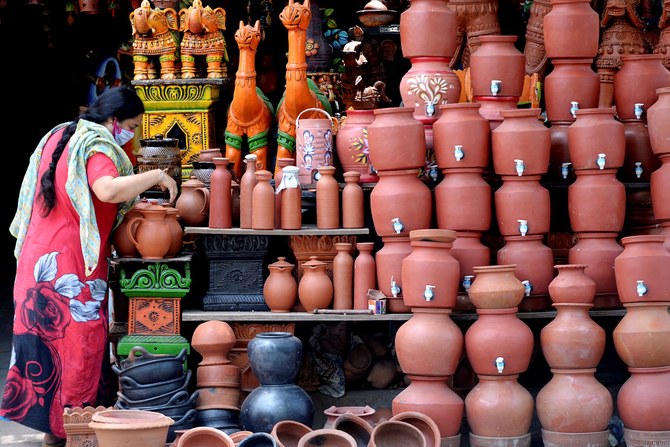NEW DELHI: Many Indians remember using clay pots to cool water decades ago, but as summers get hotter, the ancient technique is back, proving infallible in beating extreme heat.
The earthen pots are known as matka and have been used in the Indian subcontinent for millennia. During summertime, roadside stalls selling them pop up everywhere across urban and rural landscapes.
Nathulal Prajapat’s family has been in the business for three generations, producing the earthenware in Rajasthan, the northwestern state which in May was on the meteorological department’s highest alert over severe heatwaves.
Prajapat sells thousands of 20- and 30-liter matkas during the summer months.
“This is the ancient way of beating the heat ... it keeps the water cool and keeps you healthy, as it filters the water too,” he told Arab News.
“We sell at least 20,000 pots ... More and more people are using these local products to keep themselves cool.”
The clay pots cost between $7 and $10 and buyers usually replace them every year.
Dilip Kumar Singh from Pilani in Rajasthan each summer buys at least two to serve his family of five.
“Since childhood, I have been using the earthen pot, much before we got a refrigerator at home. Even after having a refrigerator at home, we still hardly use the water from there to satiate the thirst,” he said.
“Two glasses of water from the fridge will not be as satisfying as one glass of water from the earthen pot.”
As matkas can reduce the temperature by some 8 degrees Celsius, the water also will not get freezing cold.
“You will never catch a cold or sore throat if you drink water from the pitcher,” Singh said.
When a ceramic cooler is filled with water, the liquid sinks into its pores. As it evaporates from the pores, heat is extracted from the air inside the pot. As a result, everything inside stays cold.
On a smaller scale, matkas are now available in the form of flasks and bottles which, unlike 30-liter pitchers, can be carried around.
“Handling a clay bottle is easier than the earthen pot and it occupies less space and there is less danger of it getting broken,” said Namit Agrawal, a professional based in Delhi, where temperatures last week crossed 50 degrees Celsius.
“These indigenous products are a boon in the torturous summer.”
Eco-friendly, sustainable and based on the principles of evaporative cooling instead of electricity, the ancient technology has been inspiring innovation also in architecture, with perforated clay screens installed on buildings, allowing the induced airflow to ventilate the inside with chilled air.
“If we go to ancient times there were houses made of mud. It was much cooler than houses made up of brick and concrete. That is the technology that the terracotta-based walling system has brought back from ancient times,” said Bharti Jasrotia, technology transfer manager at Development Alternatives, a Delhi-based social enterprise and think tank involved in sustainable development.
“There are many architects and designers who have recently been using terracotta-made articles and installing them in the areas where thermal comfort is required.”
The clay systems only require dripping water to make the air cooler by between 6 and 8 degrees Celsius, which makes them affordable.
“We don’t need to use fresh water to drip through it. We can use the wastewater so that we can reduce the water consumption,” Jasrotia said.
“This is eco-friendly since we are not actually doing anything and not burning anything ... It is a good technology to use.”


























